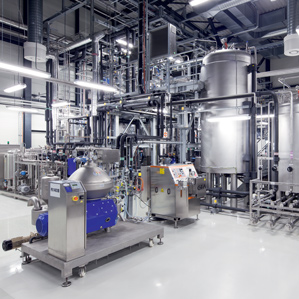Audi Bets on Bio Gasoline Startup
Audi is investing in a startup, Paris-based Global Bioenergies, that says it can make cheap gasoline from sugar and other renewable sources. The strategic partnership includes stock options and an unspecified amount of funding.

As with conventional biofuel production, Global Bioenergies technology uses microӧrganisms to ferment sugars to produce fuel. But its process eliminates the second most costly part of producing biofuels—the energy-intensive distillation step. And by making gasoline instead of making ethanol, the startup skirts a major problem hampering growth in biofuels—the fact that the market for ethanol is saturated.
Global Bioenergies has demonstrated its technology in the lab and is building two pilot facilities to produce isobutene, a hydrocarbon that a partner will convert into gasoline through an existing chemical process. The larger of the two pilot facilities will be big enough to support the production of over 100,000 liters of gasoline a year.
The process addresses one of the key challenges with conventional biofuels production—the fuel can kill the microӧrganisms that make it. In a conventional fermentation process, once the concentration of ethanol gets to about 12 percent, it starts to poison the yeast so that it can’t make any more ethanol.
Global Bioenergies has genetically engineered E. coli bacteria to produce a gas (isobutene) that bubbles out of solution, so its concentration in the fermentation tank never reaches toxic levels. As a result the bacteria can go on producing fuel longer than in the conventional process, increasing the output of a plant and reducing capital costs.
The isobutene still needs to be separated from other gases such as carbon dioxide, but Global Energies says this is much cheaper than distillation.
The new process doesn’t address the biggest cost of biofuels today—the cost of the raw materials. It’s designed to run on glucose, the type of sugar produced from corn or sugarcane. But the company is adapting it to work with sugars from non-food sources such as wood chips, which include glucose but also other sugars such as xylose.
Audi’s partnership with Global Bioenergies is part of push by the automaker to reduce greenhouse gas emissions in the face of tightening regulations. Audi recently announced two other investments in cleaner fuels. It funded a project to make methane using renewable energy—the methane can be used to run Audi’s natural-gas fueled cars (see “Audi to Make Fuel Using Solar Power”). And it funded Joule Unlimited, which is using photosynthetic microӧrganisms to make ethanol and diesel (see “Audi Backs a Biofuels Startup”).
Keep Reading
Most Popular
Large language models can do jaw-dropping things. But nobody knows exactly why.
And that's a problem. Figuring it out is one of the biggest scientific puzzles of our time and a crucial step towards controlling more powerful future models.
The problem with plug-in hybrids? Their drivers.
Plug-in hybrids are often sold as a transition to EVs, but new data from Europe shows we’re still underestimating the emissions they produce.
Google DeepMind’s new generative model makes Super Mario–like games from scratch
Genie learns how to control games by watching hours and hours of video. It could help train next-gen robots too.
How scientists traced a mysterious covid case back to six toilets
When wastewater surveillance turns into a hunt for a single infected individual, the ethics get tricky.
Stay connected
Get the latest updates from
MIT Technology Review
Discover special offers, top stories, upcoming events, and more.